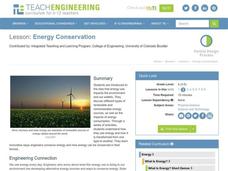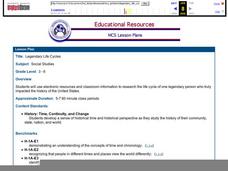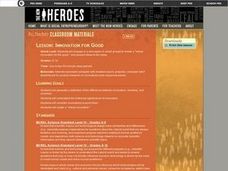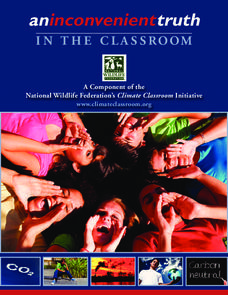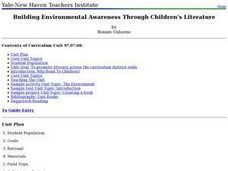Curated OER
Graphing Canada
Learners research a province of Canada choosing a question to investigate. They record their information on a worksheet that is provided and complete a graph. They present their bar graphs to the class.
Curated OER
Deformed Frogs! - The Parasite Hypothesis
This project provides young scholars the opportunity to investigate parasites as a possible cause of the observed frog deformities. It asks students to view web-based evidence and interpret whether it supports the parasite hypothesis....
Curated OER
Solar Arrays for the Space Station
Students explore the challenges that are faced when transporting materials into space. They review the various forms of energy, including solar arrays, that are used on the International Space Station and how generating this energy calls...
Curated OER
Map-A-Buddy
Learners investigate the concept of tracking and spatial movements of animals in relation to the environment in which they live. They participate in an interactive activity by tracking one another over a pre-defined region, record the...
Curated OER
Energy Conservation
Students investigate energy conservation. In this energy conservation and analyzing data instructional activity, students identify and explain several energy sources and research renewable and nonrenewable energy sources. Students use...
It's About Time
Present-Day Climate in Your Community
So what exactly is climate? This first installment of a six-part series introduces the concept of climate using real-world data tables and topographic maps. The timely lesson includes a comprehensive overview of climate, as well as...
Curated OER
Ocean Life
Mini-marine biologists use Scholastic Explorers website to learn about declining numbers of leatherback sea turtles and dusky dolphins. They fill out a K-W-L chart and observation journal worksheet, which are both provided in the lesson...
Curated OER
Legendary Life Cycles
Upper elementary historians research a legendary person who had an impact in the the history of the United States. Learners research the life of their person of choice, and construct a legendary timeline using computer software which...
Curated OER
The New England Fishing Industry:Sea Changes in a Community
Explore New England's economic and cultural past and possible issues New Englanders will face in the future. Middle and high schoolers research the fishing industry and the need for regulation. They analyze the topography of New England...
Workforce Solutions
Egg-streme Sports
Here's a new twist in the egg drop competition. Using only six inches of tape, four straws, and 2 pieces of newspaper, teams build a structure that keeps an egg from breaking when dropped. What's different about this project is that the...
Curated OER
A Wall for Peace?
Students give examples that demonstrate how people are connected to each other and the environment. They idnetify current or historic conflicts and explain how those conflicts are or were influenced by geography. Students explore about...
Curated OER
Sensational Seaweed
Students compare kelp and land plants. In this sea plant lesson, students look at the role of algae in aquatic environments. They research the properties of kelp and explore seaweed.
Curated OER
Innovation for Good
Many historical innovations were created for the common good. Get your students ready for life as a critical thinker with this lesson which defines the differences between innovation and invention. They will conduct Internet research,...
Curated OER
First-Aid Newspaper
Eighth graders research, write, edit and publish a class newspaper focusing on topics related to first aid. They research how to care for injuries and write informative articles for the paper. Students compile the articles to produce a...
Curated OER
Rockin' Round New York State
Students discuss their favorite rock groups and bands. They create rock groups that will be touring New York State. Students research cities in New York, determine dates of concerts, create touring itineraries, and develop Inspiration...
Curated OER
Anne Frank Brochure/Newsletter
Any lesson that includes time at the computer lab is a favorite for the kids! In this plan, the class heads to the lab to research Anne Frank and her life. Using both Internet and print resources (like the book), pupils compile...
Curated OER
That's Predictable - Stream Side Science
Research the impact that changes in biotic or abiotic factors might have on an ecosystem. Debate for or against the changes and take action in the community. This resource ideally follows stream studies that young ecologists may have...
National Wildlife Federation
An Inconvenient Truth in the Classroom
Global warming — what a hot topic! A thorough unit challenges learners to research, read, explore, and write about carbon, its role and increasing nature in our atmosphere, and how global warming is affecting lives and environments...
University of Minnesota
C. elegans and the Search for Extraterrestrial Life
Introduce the topic of astrobiology in a unit that's out of this world. Biology scholars examine the search for extraterrestrial life by culturing roundworms, a species that has been key in helping researchers understand the challenges...
Polar Trec
Drawing Diatoms like Ernst Haeckel
Why do scientists rely on drawings rather than just photographs of their research studies? The lesson plan introduces drawings of microscopic organisms and the importance of accuracy. Young artists draw organisms and learn why focus and...
Curated OER
Environmental Awareness and Children's Literature
Use an alternative setting for pregnant teens and young mothers, as well as special education children to examine environmental topics through literature. Included in this unit is a visit to neighborhood libraries to select children's...
Carolina K-12
Create a City!
What is the purpose of a city charter? What services do local governments provide to their citizens? Is there an ideal way for citizens to behave? Approach these often overlooked yet important questions with your class members by having...
Polar Trec
Calorimetry Lab
Young people between the ages of 11–13 need on average about 2,000 calories per day. Within the lab, groups learn about calorimetry and respiration. They explore how it pertains to humans and animals living the Arctic where cold...
Curated OER
Couch Potato or Inertia Victim?
Sixth graders how primary research is carried out. They design a simple survey questionnaire to interview people about their week average television watching time. They analyze the results and write a report based on the information.






